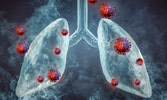Protecting your lungs is essential to maintain their proper functioning as they are delicate tissues. Your external environment contains various factors, items, and substances that can have an adverse impact on your lung health and even cause damage. Any substance you inhale can affect your lungs, making it crucial to be aware of what to avoid to keep them healthy. To learn about the factors that can harm your lungs, read on!
Items that Make Your Lungs Unhealthy
Heavy-Duty Disinfectants
- Household cleaning products like bleach, ammonia, chlorine, and air fresheners can contain harmful chemicals that can become irritants for individuals with lung disease and asthma and can decrease lung function.
Dust
- When cleaning floors and vacuuming you may be exposed to large amounts of dust, which can make symptoms of allergies and asthma worse. Dust can also begin to collect over time in the lungs and could potentially damage your airways.
Moisture and Mold
- Large amounts of moisture can lead to mold, dust mites, bacteria, and viruses. Exposure to these allergens can cause asthma attacks and respiratory problems. Moisture and mold can be found in the bathroom or kitchen sinks, flooding or indoor leaks, or moisture build-up from humidifiers or air conditioners.
Smoke
- Smoking cigarettes and secondhand smoke can cause lung disease, damage airways, and trigger inflammation in the lungs.
How to Protect Your Lungs
- Quit Smoking – For information about how smoking affects your lung health, and for resources to quit, visit this page from the American Lung Association.
- Avoid exercising outdoors in high-traffic areas or on bad air quality days.
- Exercise regularly to help promote a strong heart and good lung health.
- Improve your indoor air quality: here is a helpful guide!
Knowing what can cause harm to your lungs is essential when wanting to improve your lung health! There are many environmental irritants that can negatively affect our lungs and decrease lung function. With these helpful tips, you can start prioritizing and protecting your lung health! To find out more about our respiratory services, visit our website or reach out to our team to get started.


